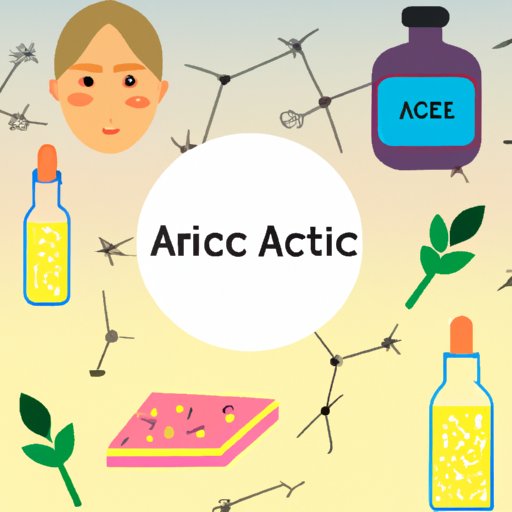Introduction
Acne is a common skin condition that can cause embarrassment and discomfort. It is caused by clogged pores, excess oil production, bacteria, and inflammation. Acne can vary in severity from mild whiteheads or blackheads to cystic acne. Symptoms can include redness, swelling, pimples, and even scarring.
Natural Acne Treatments
There are several natural remedies and home treatments you can try to make acne go away. Herbal remedies such as tea tree oil and aloe vera gel can help reduce inflammation. Honey and apple cider vinegar have antibacterial properties and can help reduce bacteria on the skin. You can also make your own masks with ingredients like oatmeal, honey, yogurt, and lemon juice.
The benefits of natural treatments are that they are generally inexpensive and free from harsh chemicals. They can be used safely on all skin types and are generally gentler than over-the-counter treatments.
Skin Care Products With Salicylic Acid
Salicylic acid is an active ingredient in many over-the-counter acne treatments. It helps exfoliate the skin and reduce inflammation. It can be found in cleansers, toners, and spot treatments. Products containing salicylic acid can be effective in treating mild to moderate acne.
The benefit of using products with salicylic acid is that it is a powerful acne-fighting ingredient. It is also readily available and easy to use. However, it can be drying and irritating, so it is important to follow directions carefully and use only as directed.
Healthy Diet
Eating a balanced diet rich in fruits, vegetables, and whole grains can help keep your skin healthy. Avoid processed foods and sugar, as these can trigger breakouts. Try to include foods that are high in omega-3 fatty acids, zinc, and vitamin A, as these can help fight inflammation and reduce sebum production.
Examples of foods that can help clear up acne include salmon, avocados, spinach, sweet potatoes, nuts, and seeds. Drinking plenty of water throughout the day can also help flush toxins out of your body.
Exercise
Regular exercise can help improve circulation and deliver oxygen and nutrients to your skin. It can also help reduce stress, which can trigger breakouts. Aim for at least 30 minutes of exercise per day. This can include walking, running, swimming, yoga, or any other form of exercise you enjoy.
Make sure to shower after exercising to help remove sweat and dirt that can clog pores. Also, avoid wearing tight clothing during exercise, as this can trap sweat and bacteria against the skin.
Avoid Touching Your Face
Touching your face can spread bacteria and cause more breakouts. This includes picking at existing pimples, which can lead to infection and scarring. To avoid touching your face, keep your hands away from your face and avoid resting your chin on your hand.
It’s also important to wash your hands frequently throughout the day to remove dirt and bacteria. This can help minimize the risk of transferring bacteria to your face.
Facials and Other Treatments
Getting regular facials can help remove dirt and oil from the skin and unclog pores. Different types of facials can target different skin concerns, including acne. Some facials may also include extractions, which involve squeezing out blackheads and whiteheads.
In addition to facials, there are other treatments available to help reduce acne. Chemical peels and laser treatments can help reduce inflammation and bacteria on the skin. These treatments should be done by a professional.
Conclusion
Making acne go away can be a long process, but it doesn’t have to be daunting. There are several natural remedies and skin care products available to help treat acne. Eating a healthy diet, exercising regularly, avoiding touching your face, and getting regular facials can also help make acne go away. If you are still having trouble managing your acne, seek advice from a dermatologist.


